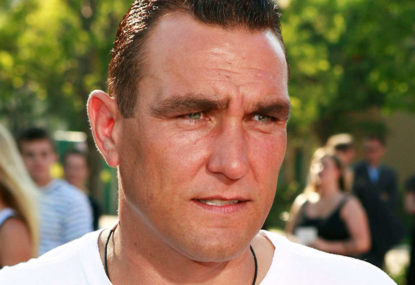Controversy as Villa keeper handed second yellow for shootout crowd taunting... but isn't sent off
Emi Martinez was saved by a new rule that resets yellow cards at the end of extra time, meaning his second yellow for taunting…

This could well be the title of a film about the life and work of Vinnie Jones, also known as ‘Vinnie CoJones’, ‘The Butcher of Wales’ or simply ‘Psycho’.
In a football world as politically correct as today, Jones could not even step on the football field bleachers, but in the late 1980s and during the first half of the ’90s, the midfielder was one of the emblems of Wimbledon FC.
A modest team of the southern suburbs of London, Wimbledon surprised everyone in season 1987-88 by winning the FA Cup against the almighty Liverpool.
Jones was, from 1984, the leader of the legendary team that was known to all as ‘The Crazy Gang’ which, under the guidance of coach Dave Bassett, climbed from the fourth division to the top flight of English football, leaving a trail of bruised rivals in its wake.
In his almost 400 games as a professional footballer (divided into five teams) Vinnie fuelled his bad boy reputation. Thanks to criminal kicks, punches and malicious behaviour typical of a gangster, Jones won himself the dubious honour of being considered one of the most dirty and unfair players who ever played in the top flight of English football.
Perhaps his most memorable moment on a field was in the 1987-88 season, during the match for the second round of the FA Cup, which Wimbledon would eventually win. Against Newcastle, Jones literally hunted another heavyweight, Paul Gascoigne, who in those years was beginning to shine in the Toon team.
Throughout the match, the midfielder not only handed ‘Gazza’ terrible kicks but also squeezed his testicles in such a violent way that, even today, we’re still surprised that Gascoigne has left descendants.
Despite criticism that aroused his rough way to play, Jones was hired by the coach of Leeds United, Howard Wilkinson, who, according to his own words, had signed Vinnie to “impart character to the team”. The player took the appreciation of the new manager seriously and during the first training session with his new team, Jones hit Bobby Davison directly in the face.
Despite this fact, the former Wimbledon player was erected soon as the leader of the locker room and was one of the mainstays of the team, which finally achieved promotion to the first division. But luck did not last long and soon the dreaded Vinnie had to make the bags – first to Sheffield United and two years later he wore the colours of Chelsea.
Not being able to settle in any of the two teams the prodigal son of Wimbledon decided to return home to play the 1992-93 season. For six years he was the engine of a team that was far from living their best seasons but, through Vinnie Jones and his kicks, could evoke, even for a moment, the old glory days. His retirement from the playing field became effective at the end of the 1998-99 season after a step for nothing memorable in the QPR.
Despite being highly criticised by the world of football, Jones had his chance as an international player but not for England. The Welsh ancestry from his grandmother allowed Vinnie to play nine games with the national team, but his passing was not as expected. When reporters asked Jones if he ever expected to play a World Cup Jones, true to his direct style, replied: “I’m Vinnie Jones, of course I’d like to play a World Cup, but I play for Wales”.
Over time, and thanks to its reputation as a gangster, filmmaker Guy Ritchie offered him a role in the film Lock and Stock and Two Smoking Barrels, where he played a hired thug called Big Chris. Eventually Jones made his name in the film industry and currently carries more than thirty movies but, as we all know, no one ever forgets the first love.
Vinnie is still linked to the world of football, but in the role of commentator for American television, along with old glories of the MLS such as Eric Wynalda and Coby Jones.
Maybe it’s because he misses his days of glory in the field or simply habit, but at the door of his mansion in Los Angeles there is a sign that says: ‘Do not be afraid of the dog, be afraid of the owner’. The old dog has not lost the tricks.